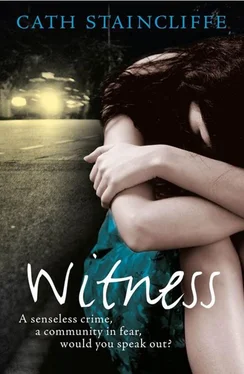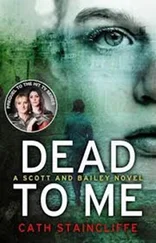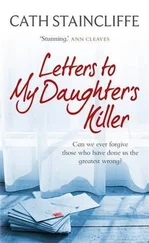‘Well, you don’t go anywhere until you’ve checked and you’ve done it.’
Owen kept eating.
‘Did you hear me?’ She was irritated at how he ignored her.
‘I’m not deaf,’ Owen retorted and got to his feet, scraping the chair across the wood flooring.
‘Well, don’t act like you are then,’ she said sharply.
Owen glared at her, his face reddening.
Fiona couldn’t bear it. She raised a hand, fingers spread, trying to be reasonable. ‘Maybe it’s about time I trusted you to do your homework,’ she said, ‘without any nagging from me. Okay? So it’s up to you from now on.’
He waited, shoulders slumped, head on one side, mouth open, a study in tedium, to see if she had finished. Then he walked away. Her eyes prickled, she sniffed hard. It won’t always be like this, she reminded herself. It will change.
After tea she read the local evening paper. All week she had been devouring coverage about the murder. Each time she found an item her heart would swell and her throat tighten. Often she would weep, the tears always so close to the surface. She read and reread, hoping to find something there, some meaning, some understanding. She drank in the details about the boy and his family: his parents Paulette and Stephen, Danny’s twin sister Nadine, also a hard-working student who wanted to make films, the grandmother Rose. Fiona pored over the pictures, the school photographs, the family occasions.
Tonight the article carried a photograph of the family in mourning. Dark clothes and harrowed expressions outside their church. Preparations were under way for the funeral. Momentarily Fiona considered going. But the germ of the idea was crushed by the weight of fear. It might prompt another attack. The GP had told her that it could be a couple of weeks before the medication started working and she should avoid stressful situations. It felt craven, cowardly, but she could not risk it. Both for her own sake but also because she knew it would be unforgivable if she went and the worst happened and she distracted attention from what really mattered. The burial of a child.
She didn’t like to throw the papers in the bin, it seemed irreverent. Instead she cut out the articles about Danny first and put them in a large envelope. She left it in the dining room, with her work files. She did it secretively, waiting until she was alone, though she wasn’t sure why. Perhaps it seemed ghoulish.
Fiona no longer trusted herself to drive. The car brought associations of both the murder and the crippling panic. So when the police wanted her to go in and make a statement she asked if it would be possible to do it at her house. She might have been able to work out a bus route or hire a cab but if going over the incident made her ill with anxiety she wanted to be under her own roof. The man she spoke to, DI Kitson, agreed and turned up promptly on the Tuesday afternoon.
Joe was a nice man, softly spoken. She’d expected someone with more bluster or drive, someone sharper round the edges. He put her at her ease and set up his laptop to take notes. She liked the way he listened to her, really listened, instead of simply waiting for her to stop talking so he could start, which is how many of her male colleagues in senior positions behaved. And he thought carefully when she asked him questions rather than jumping straight in with a response.
He had a sketch of the area – the main road and the recreation ground. The houses and their back yards all marked off exactly like the diagrams on house deeds. He took it a stage at a time, asking her to show him where she was when she left the house, after she crossed the road, when she reached Danny – and what else she saw, who else she remembered each time. She was back there, blink, the sun hot on the nape of her neck and her hands on Danny’s chest, blink, his blood still warm on his T-shirt. She felt sick, felt her gullet spasm and her ears buzz. She made a noise and he saw. He knew.
‘Breathe out,’ he said, ‘slowly. Good, that’s good. Wait, shallow now.’ It was ironic – exactly the sort of coaching she would use with one of her mums in labour.
He repeated the words until she’d calmed. ‘I’m sorry,’ he said, ‘something like this, it’s a terrible thing.’
‘I have a son,’ she said. A sudden urge to confide. Wiping at her face with her fingers.
He nodded. He knew of course, that was one of her background details.
Joe explained there were two areas he wanted to focus on more closely, to see if she could add anything further: one was the car that had almost run her over and the other was the man behind the wheel. She’d already described a silver BMW. He asked if she could recall any details.
‘I didn’t see the number plate.’
‘What about the windscreen, the tax disc?’
She shook her head. ‘It was so fast.’
‘Any decals, decorations, anything dangling from the rear-view mirror?’
It was a blank. All she could see was the sheen of the glass and the glimpse of the man.
‘What did he look like?’
‘He was white, a slim face, a wide mouth.’ She had practised this, gone over it again and again in her mind’s eye, determined not to let the snapshot fade. ‘Very short hair, pretty really, like a male model. Good cheekbones. I’m sorry.’ She laughed at herself and Joe gave an easy grin. ‘A bit like Johnny Depp,’ she added. ‘That sounds so stupid. But that’s who he reminded me of.’
‘That’s very good. Anything else? Clothes, hands?’
‘I only saw his face. He braked, I jumped back, there was this moment-’ her voice shook and her mouth felt dry – ‘we were just staring at each other, both shocked.’ She recalled the way he glared at her. ‘And then he drove on.’
‘And the other man?’
‘I barely registered him. I could tell there were two people in the car but I only saw the driver.’
Joe shifted in his seat. Typed a bit more into his laptop. Then he explained that he’d like her to try and identify the man she saw but she would have to do that at the police station. It was important to make sure it was done above board, the right checks and balances. ‘Someone else has to do it, I’m not allowed.’ He smiled. ‘Make sure I don’t tip you the wink.’
Fiona felt uneasy. ‘I don’t know.’
‘We could pop along now,’ he said quietly. ‘No fuss, no complicated arrangements. Be back within the hour.’ His eyes were greeny grey, the colour of shale, of bay leaf.
Later she thought he had planned it like that, making it easier to do because she wouldn’t be anticipating it, wouldn’t have a chance to get cold feet.
Still she hesitated. ‘But if I…’
He read her mind. ‘You find it’s too much, I’ll bring you straight home.’
She agreed. Wanting to be brave, wanting to impress him. Pathetic, she told herself.
The drive took only ten minutes and when they got to the police station it was all set up. Joe left her with a jovial, whiskery man and a younger woman. There was a monitor for her to watch and a camera would record Fiona’s reactions for evidence.
‘What we have are eight video IDs,’ the man said. ‘I’d like you to watch them, all of them, and only at the end tell me if the man you saw driving the BMW is among them and which number he is. You can look again at any of the images and we can freeze them for you too, if you ask. You can’t ask me any questions and please take your time. Is that all right?’
It was and the woman set the camera going.
They were like moving mug-shots, Fiona thought to herself, the men looking straight ahead then turning this way and that for the profiles. The men were all white with short hair. She saw him, number four, with a lurch of recognition. Then did as instructed and watched the rest. None of the others came close. ‘Number four.’ Her voice sounded dusty. ‘That was him.’ The man put number four back on the screen. He had large, dark eyes. A sensuous mouth, the sculpted face. Dress him in ringlets and kohl, pantaloons and a frilly shirt, and he could be Captain Jack in Pirates of the Caribbean .
Читать дальше












